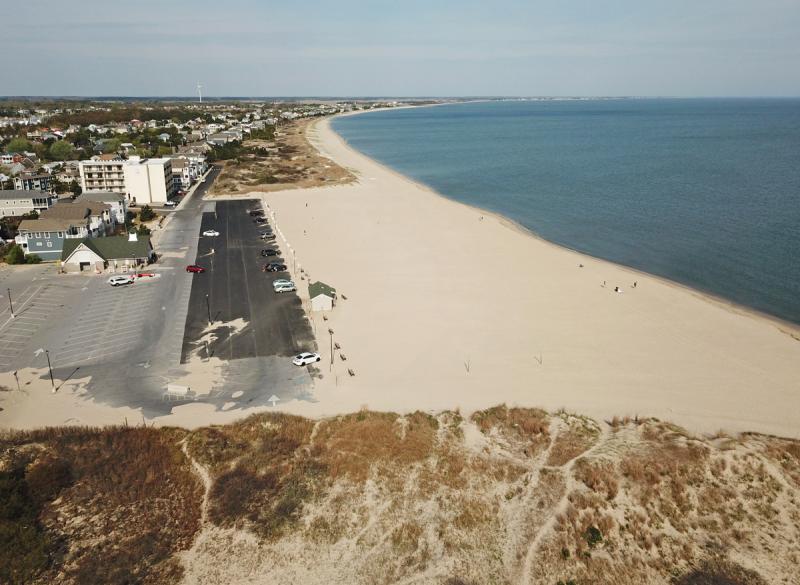Tony Pratt, who spent 38 years building dunes throughout the state, said the pros of adding a dune at Lewes’ main beach may not outweigh the cons.
“What’s broken currently that you’re trying to fix with a dune?” asked the former shoreline administrator for DNREC. “You’d have to ask yourself that question. I don’t have an opinion.”
Mayor Ted Becker and City Manager Ann Marie Townshend set up the workshop April 16 to discuss the possibility of allowing a natural dune to build on the beach in front of the main parking lot at the end of Savannah Road. For at least 40 years, Becker said, the city has put up snow fence on the beach in the windier winter months to stop sand from blowing into the parking lot and beyond. The result is a 2- to 3-foot accumulation behind the fence, which is flattened at no charge by the Department of Natural Resources and Environmental Control each spring.
Becker said a dune could offer better storm protection, provide natural environmental area, and prevent sand from blowing and accumulating in the parking lot. The latter is a constant battle for the Streets Department, as staff clears the parking lot comprehensively three to four times a year and quick cleanups several other times annually.
“That’s an added expense, sometimes requiring more than a day’s worth of time to gather the sand and redeposit it,” he said.
The main drawback of a dune is the loss of the bay vista.
“Short of looking at the ships and boats offshore and around town, there’s nothing more I can think of that reinforces our No. 1 core value – our relationship to the sea – than being able to drive into that parking lot and see an 18-mile vista to Cape May,” said resident Rob Davis. “I would really hate to lose that.”
Resident Linda Blumner, who lives just west of the parking lot, said there are at least a dozen cars in the parking lot from dawn to sunset, no matter the time of year.
Resident Gary Stabley said the beach as it is today is very valuable to the city.
“What is the asset value of that beach now? And what would it be after you [build a dune] and people couldn’t see out?” he said. “You’re collecting on that asset now with parking fees. It’s a natural asset.”
Pratt said some of the perceived benefits may not solve any problems. He said a dune likely wouldn’t prevent sand from blowing onto the parking lot, and storm protection is unnecessary.
“We haven’t taken a wave over the dune anywhere on Lewes Beach in my history,” he said. “Even the Storm of ’62, we didn’t take any waves over Lewes Beach. All the flooding came from the canal side.”
He said the bay breakwaters and Cape Henlopen provide protection for Lewes, resulting in very few waves.
Resident Gail van Gilder asked if the city should consider a dune as a proactive measure to prepare for sea-level rise.
Pratt said flooding historically comes from the canal side of Lewes Beach, and city officials in the future will likely have to worry more about that. Flooding that occurs only a few times a year on Cedar Street now will likely increase to eight times a year over time and then to 15 times a year after that. At some point, there will be sunny day flooding, he said, and officials will have to deal with the higher water.
If the city were to move forward with a dune, Pratt said, the city has to be prepared to maintain it.
“You’d have to build crossings,” he said. “As somebody who’s maintained crossings in every beach community in the state of Delaware for 38 years, get ready to do some major infrastructure work every year. And not just once a year, three to four times a year. It’s a lot of work.”
The addition of a dune may also result in state involvement.
“Once you vegetate that dune you’re subject to regulations by the state, and you can’t touch it,” he said. “If it gets to be 20 feet high, learn to love it because that’s what you’re going have.”
Resident Laurel Quinn said she came to the meeting in favor of a dune, but changed her mind after hearing Pratt talk about the issues.
“We can always do it later if we need it for some reason,” she said. “We don’t need it right now. That view for the people who go there, it’s meditative and calming. It’s why people go to the beach.”
Becker said he’s received a lot of feedback from residents over the years, both for and against a dune. He expects to put the issue on an upcoming city council agenda to put it to bed.
Nick Roth is the news editor. He has been with the Cape Gazette since 2012, previously covering town beats in Milton and Lewes. In addition to serving on the editorial board and handling page layout, Nick is responsible for the weekly Delaware History in Photographs feature and enjoys writing stories about the Cape Region’s history. Prior to the Cape Gazette, Nick worked for the Delmarva Media Group, including the Delaware Wave, Delaware Coast Press and Salisbury Daily Times. He also contributed to The News Journal. Originally from Boyertown, Pa., Nick attended Shippensburg University in central Pennsylvania, graduating in 2007 with a bachelor’s degree in journalism. He’s won several MDDC awards during his career for both writing and photography. In his free time, he enjoys golfing, going to the beach with his family and cheering for Philadelphia sports teams.
























































